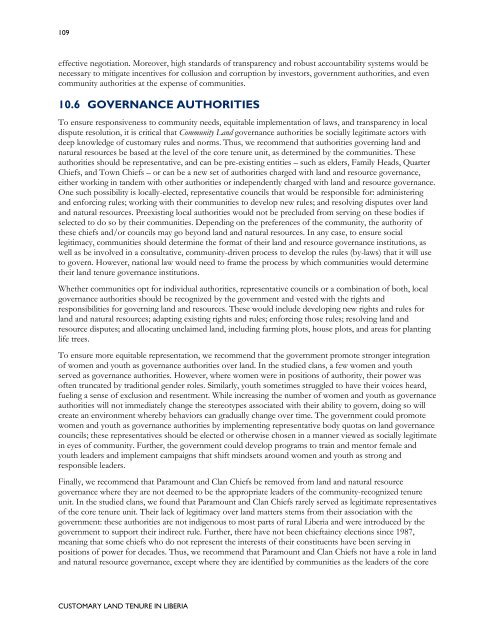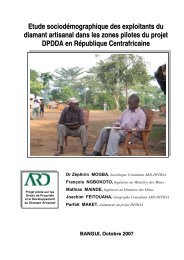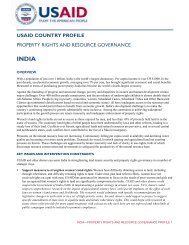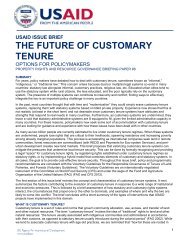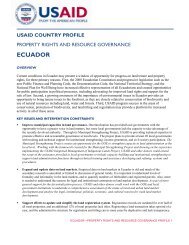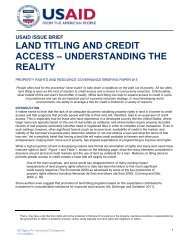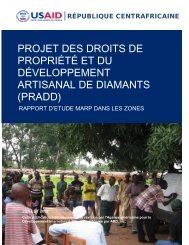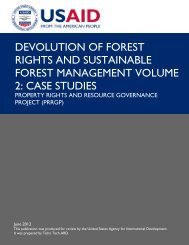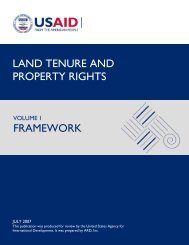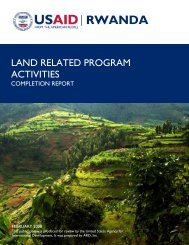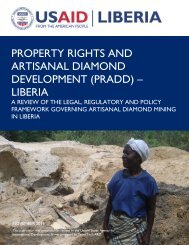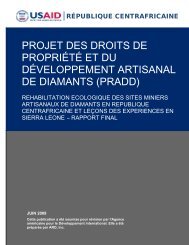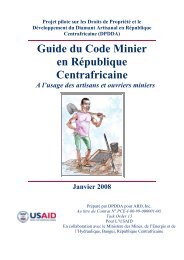Customary Land Tenure in Liberia - Land Tenure and Property ...
Customary Land Tenure in Liberia - Land Tenure and Property ...
Customary Land Tenure in Liberia - Land Tenure and Property ...
You also want an ePaper? Increase the reach of your titles
YUMPU automatically turns print PDFs into web optimized ePapers that Google loves.
109<br />
effective negotiation. Moreover, high st<strong>and</strong>ards of transparency <strong>and</strong> robust accountability systems would be<br />
necessary to mitigate <strong>in</strong>centives for collusion <strong>and</strong> corruption by <strong>in</strong>vestors, government authorities, <strong>and</strong> even<br />
community authorities at the expense of communities.<br />
10.6 GOVERNANCE AUTHORITIES<br />
To ensure responsiveness to community needs, equitable implementation of laws, <strong>and</strong> transparency <strong>in</strong> local<br />
dispute resolution, it is critical that Community <strong>L<strong>and</strong></strong> governance authorities be socially legitimate actors with<br />
deep knowledge of customary rules <strong>and</strong> norms. Thus, we recommend that authorities govern<strong>in</strong>g l<strong>and</strong> <strong>and</strong><br />
natural resources be based at the level of the core tenure unit, as determ<strong>in</strong>ed by the communities. These<br />
authorities should be representative, <strong>and</strong> can be pre-exist<strong>in</strong>g entities – such as elders, Family Heads, Quarter<br />
Chiefs, <strong>and</strong> Town Chiefs – or can be a new set of authorities charged with l<strong>and</strong> <strong>and</strong> resource governance,<br />
either work<strong>in</strong>g <strong>in</strong> t<strong>and</strong>em with other authorities or <strong>in</strong>dependently charged with l<strong>and</strong> <strong>and</strong> resource governance.<br />
One such possibility is locally-elected, representative councils that would be responsible for: adm<strong>in</strong>ister<strong>in</strong>g<br />
<strong>and</strong> enforc<strong>in</strong>g rules; work<strong>in</strong>g with their communities to develop new rules; <strong>and</strong> resolv<strong>in</strong>g disputes over l<strong>and</strong><br />
<strong>and</strong> natural resources. Preexist<strong>in</strong>g local authorities would not be precluded from serv<strong>in</strong>g on these bodies if<br />
selected to do so by their communities. Depend<strong>in</strong>g on the preferences of the community, the authority of<br />
these chiefs <strong>and</strong>/or councils may go beyond l<strong>and</strong> <strong>and</strong> natural resources. In any case, to ensure social<br />
legitimacy, communities should determ<strong>in</strong>e the format of their l<strong>and</strong> <strong>and</strong> resource governance <strong>in</strong>stitutions, as<br />
well as be <strong>in</strong>volved <strong>in</strong> a consultative, community-driven process to develop the rules (by-laws) that it will use<br />
to govern. However, national law would need to frame the process by which communities would determ<strong>in</strong>e<br />
their l<strong>and</strong> tenure governance <strong>in</strong>stitutions.<br />
Whether communities opt for <strong>in</strong>dividual authorities, representative councils or a comb<strong>in</strong>ation of both, local<br />
governance authorities should be recognized by the government <strong>and</strong> vested with the rights <strong>and</strong><br />
responsibilities for govern<strong>in</strong>g l<strong>and</strong> <strong>and</strong> resources. These would <strong>in</strong>clude develop<strong>in</strong>g new rights <strong>and</strong> rules for<br />
l<strong>and</strong> <strong>and</strong> natural resources; adapt<strong>in</strong>g exist<strong>in</strong>g rights <strong>and</strong> rules; enforc<strong>in</strong>g those rules; resolv<strong>in</strong>g l<strong>and</strong> <strong>and</strong><br />
resource disputes; <strong>and</strong> allocat<strong>in</strong>g unclaimed l<strong>and</strong>, <strong>in</strong>clud<strong>in</strong>g farm<strong>in</strong>g plots, house plots, <strong>and</strong> areas for plant<strong>in</strong>g<br />
life trees.<br />
To ensure more equitable representation, we recommend that the government promote stronger <strong>in</strong>tegration<br />
of women <strong>and</strong> youth as governance authorities over l<strong>and</strong>. In the studied clans, a few women <strong>and</strong> youth<br />
served as governance authorities. However, where women were <strong>in</strong> positions of authority, their power was<br />
often truncated by traditional gender roles. Similarly, youth sometimes struggled to have their voices heard,<br />
fuel<strong>in</strong>g a sense of exclusion <strong>and</strong> resentment. While <strong>in</strong>creas<strong>in</strong>g the number of women <strong>and</strong> youth as governance<br />
authorities will not immediately change the stereotypes associated with their ability to govern, do<strong>in</strong>g so will<br />
create an environment whereby behaviors can gradually change over time. The government could promote<br />
women <strong>and</strong> youth as governance authorities by implement<strong>in</strong>g representative body quotas on l<strong>and</strong> governance<br />
councils; these representatives should be elected or otherwise chosen <strong>in</strong> a manner viewed as socially legitimate<br />
<strong>in</strong> eyes of community. Further, the government could develop programs to tra<strong>in</strong> <strong>and</strong> mentor female <strong>and</strong><br />
youth leaders <strong>and</strong> implement campaigns that shift m<strong>in</strong>dsets around women <strong>and</strong> youth as strong <strong>and</strong><br />
responsible leaders.<br />
F<strong>in</strong>ally, we recommend that Paramount <strong>and</strong> Clan Chiefs be removed from l<strong>and</strong> <strong>and</strong> natural resource<br />
governance where they are not deemed to be the appropriate leaders of the community-recognized tenure<br />
unit. In the studied clans, we found that Paramount <strong>and</strong> Clan Chiefs rarely served as legitimate representatives<br />
of the core tenure unit. Their lack of legitimacy over l<strong>and</strong> matters stems from their association with the<br />
government: these authorities are not <strong>in</strong>digenous to most parts of rural <strong>Liberia</strong> <strong>and</strong> were <strong>in</strong>troduced by the<br />
government to support their <strong>in</strong>direct rule. Further, there have not been chiefta<strong>in</strong>cy elections s<strong>in</strong>ce 1987,<br />
mean<strong>in</strong>g that some chiefs who do not represent the <strong>in</strong>terests of their constituents have been serv<strong>in</strong>g <strong>in</strong><br />
positions of power for decades. Thus, we recommend that Paramount <strong>and</strong> Clan Chiefs not have a role <strong>in</strong> l<strong>and</strong><br />
<strong>and</strong> natural resource governance, except where they are identified by communities as the leaders of the core<br />
CUSTOMARY LAND TENURE IN LIBERIA


